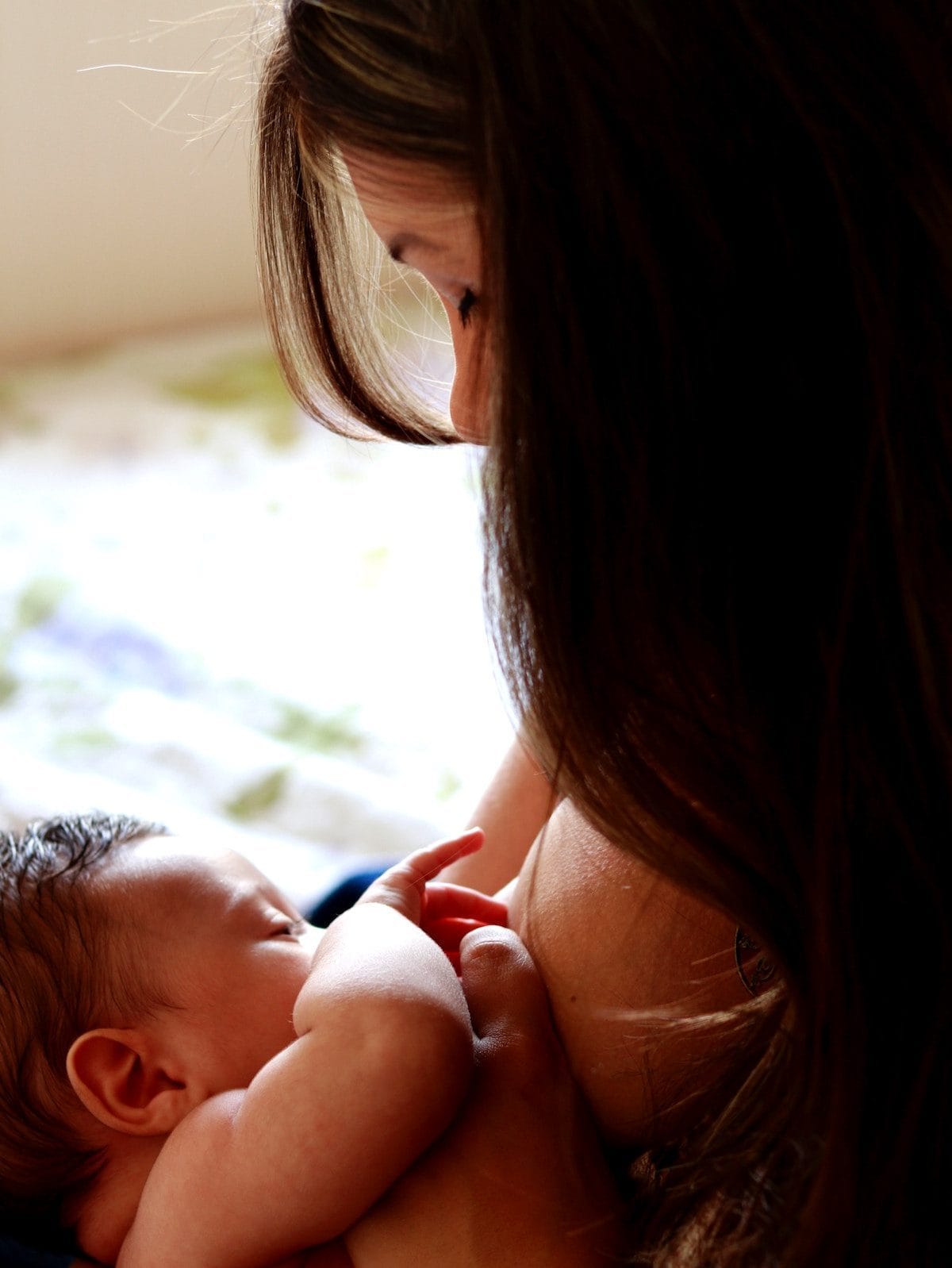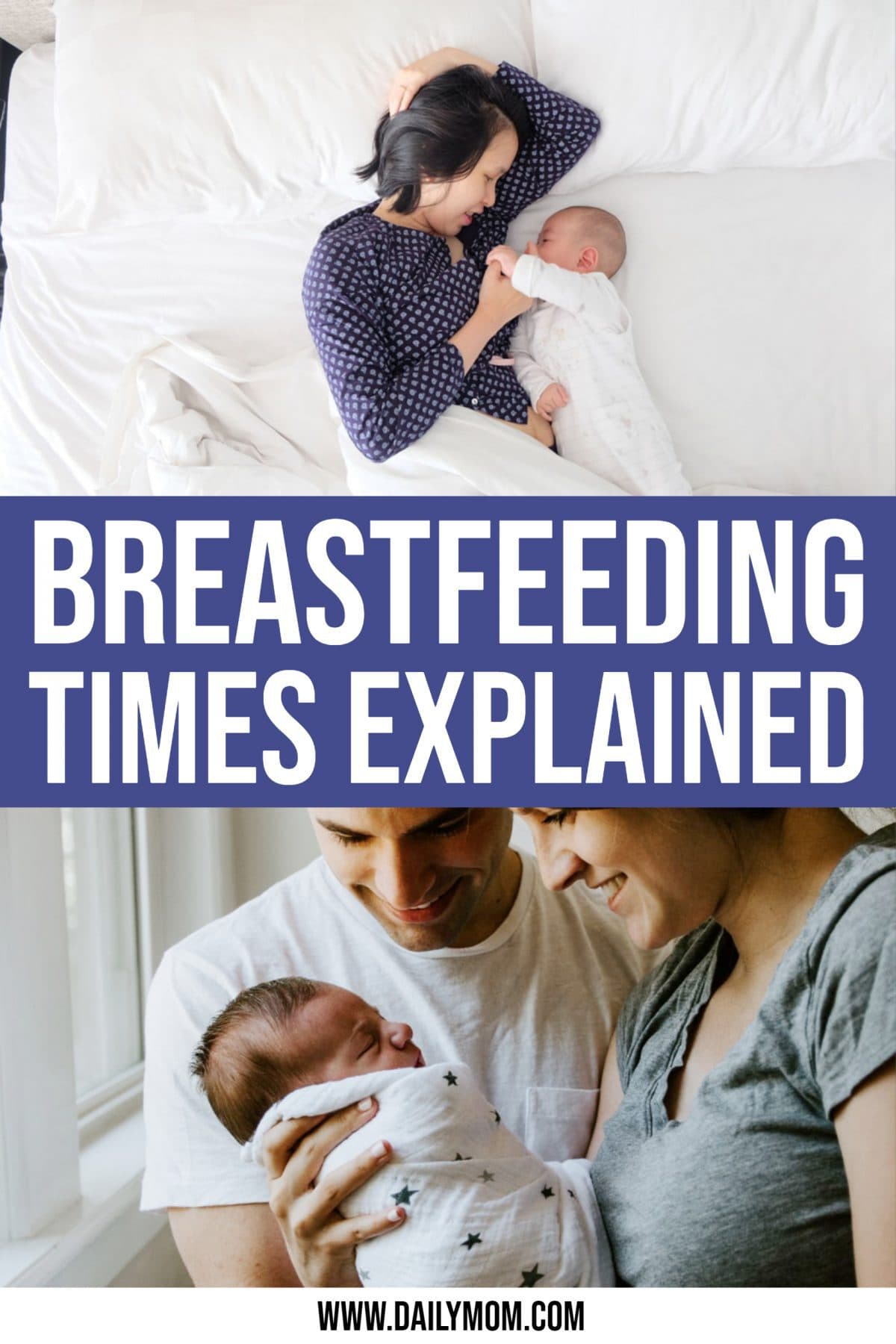How long to breastfeed a new baby is one of the very first questions new mothers ask after giving birth. Since we were all first-time mamas once, we know just how confusing the breastfeeding journey can be, especially when trying to figure out just how much and how often to feed your new baby.

It’s a good question in several regards; how long should you breastfeed at a single feeding, how long should you breastfeed exclusively, and how long should your breastfeeding journey last? Here we will look at the first question of how long should you breastfeed in a single feeding. Since you can’t tell how much your baby is getting to eat when they nurse, new moms everywhere fret that their little one likely isn’t getting enough to eat. Unless of course you want to break out a medical grade scale and weigh your baby right before and after every feeding there are a few solutions for new mothers to follow. Below are some tips to help you figure out how long to breastfeed your newborn.
Breastfeeding ‘Best Practices’

Every every baby is different but here are some guidelines that may be helpful to you:
- Nurse on Demand
Breastfeed when your baby wants to eat. Sutter Health says that the average newborn will nurse 8-12 times in a 24 hour period. Your baby may nurse for a longer or shorter time depending on how efficient they are. Generally, as baby your gets bigger and more mature, the more efficient they will be at nursing and the less time they will nurse per session.
2. Diaper Check
Babies who are fed and full typically have 8 wet diapers in a 24 hour period. This means pee not poo. Breastfed babies can go several days without a poop so be sure to be looking specifically for urine output.
3. Weight Check
Newborns lose weight in their first few days of life but after the first week, they should no longer be losing weight. Babies who are getting enough to eat should be gaining weight, but will at the very least not lose any more weight.
4. Breast Check
Generally, your breasts will feel softer after a good feeding. Of course this depends on your baby. Some babies will only eat from one side per feeding even when offered both breasts and some babies eat only a little but eat more often. In general, your breasts should soften some after feeding as they will be less full.
How Long to Breastfeed on Average
The average newborn will nurse 8-12 times a day (24 hours) for 20 to 45 minutes but don’t fret if your baby only nurses for 5 minutes or takes an hour. Every baby is different and there are other variables to consider:
- Nursing with a good latch – If your baby has a good latch from the very beginning or early on, they may be more efficient at nursing and may only nurse a few minutes on each side and still be well fed. Take cues from your baby. He’ll know when he’s had enough and will release the latch on his own, or he may be so satisfied that he falls asleep in which case you’ll be able to gently take him off of your breast. Falling asleep while nursing isn’t always a good sign though. If baby is nursing with a bad latch, then no matter how long he nurses he likely isn’t getting enough eat and may fall asleep at the breast simply because he has had to work so hard for a meal. If you notice that your baby always seems hungry or often falls asleep while nursing and it is painful for you, then your baby may not be latching well and therefore not be getting enough milk per breastfeeding session.
- Nursing with a bad latch – If your baby has a bad latch, they may not be getting enough milk or it may take them a much longer time to get enough milk to make them satisfied. If you are not sure if baby has a bad latch here are some signs:
- Pain – Breastfeeding should be relatively painless for you mama. If your breasts hurt, feel pinched, sore, or have the feeling of being poked by a bunch of tiny pins and needles, odds are that baby isn’t latching well. If this is the case, try gently removing the baby from your breast and then try the latch again. This can be a bit nerve-wracking with a hungry, crying baby but it is better to get baby latched well than to endure the pain caused by a bad latch.
- Cracked or Bleeding Nipples – This is a telltale sign that your baby is nursing with a bad latch. An improper latch is not only painful during nursing, but some of the consequences of a bad latch (aside from a hungry baby who isn’t satisfied), are that your nipples will crack and bleed causing additional pain after breastfeeding.
- Try this Lanolin Cream to help heal cracked and bleeding nipples.
- Try this nipple guard while breastfeeding to help protect your nipples from any additional damage. It may even have the added benefit of helping the baby get a proper latch.
- Flat Nipples – If your nipples looked pinched or flattened after a feeding (which will likely have been painful), it is a sign that baby isn’t latching correctly. Baby should not be latching only to the nipple, but rather to both the nipple and part of the areola as well.
- Try this Nipple Everter to help draw out your nipple prior to breastfeeding and help baby get a better latch.
Milk supply – For some mothers, it takes longer for their milk to come in than for others. If your milk supply is not in or low, this could affect how long your baby nurses as well. You can increase your milk supply by feeding on-demand as your body adjusts to producing enough milk for your baby. The more he sucks, the more milk you’ll make though of course, every mama is different. If you’re concerned that your supply is low, try talking to a lactation consultant. Most lactation consultants are very helpful, super knowledgeable, and above all supportive of the breastfeeding journey!
How baby eats – Is your baby focused on the task of eating? If your baby is easily distracted, watching older siblings for example, it might take them longer to nurse. Try breastfeeding in a quieter place to remove distractions and help baby focus solely on eating.
Read More: Check out these 7 Ways to Handle Breastfeeding Challenges
Is Baby Breastfeeding Long Enough?

If you are having problems breastfeeding or are unsure if your baby is getting enough to eat, there are breastfeeding resources. Breastfeeding may be natural but it is not easy.
- Lactation consultants – Usually the hospital or local clinic has one or more breastfeeding consultants on staff. If they have one at the hospital, be sure to see one before you head home with a new baby. Often they will make appointments to see you in the weeks after the baby arrives. Lactation consultants can teach you different breastfeeding techniques, and help you to help baby master the latch. Just don’t be shocked the first time they grab your boob and your baby simultaneously! (They’re only helping you on your way to being comfortable breastfeeding baby.)
- Online help – Organizations like La Leche League have breastfeeding tips, answers to frequently asked breastfeeding questions, and online breastfeeding support. Mommy blogs and the parenting sections/boards of some social media sites are also full of supportive communities and tips from mothers on how to breastfeed successfully.
Professional Breastfeeding Recommendations
- The World Health Organization along with UNICEF recommend:
- Breastfeeding within the first hour of life.
- ‘Breastfeeding on Demand’ – Breastfeeding whenever your baby wants.
- Exclusive breastfeeding – Breastfeeding only, no formula, water, or food.
- The American College of Obstetricians and Gynecologists recommends:
- Waking baby to feed if more than 4 hours have passed since the last feeding.
- La Leche League recommends:
- Aim to nurse 8-12 times in 24 hours.
- Breastfeed when the baby shows signs of hunger.
- Learn baby’s hunger cues.
- Breastfeed before the baby starts to cry.
- Breastfeeding at night is important.
Read More: Breastfeeding Basics for the Back to Work Mom
Every baby is different. Every Mama is different. Don’t be afraid or ashamed to ask for help. If you have questions about nursing, odds are that a mama near you has had the same questions or issues with breastfeeding. Cheers to all the mamas trying to figure out the breastfeeding game!
WANT TO READ MORE?
Problems breastfeeding? Check out The Emotional Journey of Breastfeeding.

Sources: Kidshealth.org | Sutterhealth.org | llli.org | WHO.int | ACOG.org









































